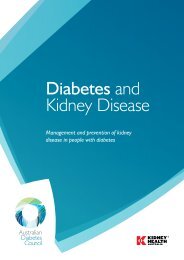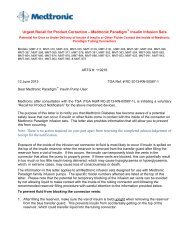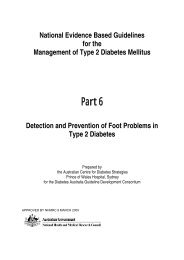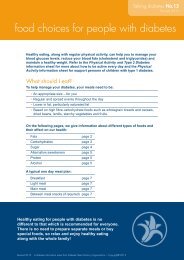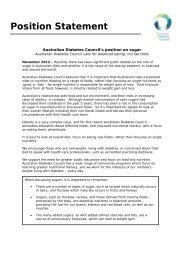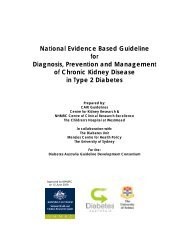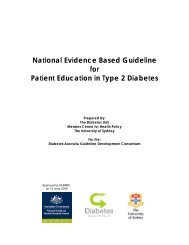Tamil - Australian Diabetes Council
Tamil - Australian Diabetes Council
Tamil - Australian Diabetes Council
- No tags were found...
Create successful ePaper yourself
Turn your PDF publications into a flip-book with our unique Google optimized e-Paper software.
7<br />
What’s in food<br />
You may have heard about:<br />
• Carbohydrates<br />
• Fibre<br />
• Protein<br />
• Fat<br />
• Vitamins and Minerals.<br />
These are called nutrients and they help your body to work properly and stay healthy. A nutrient<br />
is a substance found in food. You can find more information on each of these nutrients below.<br />
Carbohydrates<br />
Carbohydrates are the best energy source for your body. When they are eaten they<br />
breakdown to form glucose in the bloodstream. Eating regular meals and spreading your<br />
carbohydrate foods evenly over the day can help to maintain your energy levels without<br />
causing blood glucose levels to go too high or too low.<br />
Carbohydrate foods include:<br />
• Breads and cereals (e.g. rice, idli (savory cake made from fermented rice and black lentils),<br />
dosa (fermented crepe or pancake made from rice batter and black lentils) and uppuma<br />
(breakfast food made from semolina))<br />
• Milk and yoghurt (e.g. buttermilk and Thayir (yoghurt rice dish))<br />
• Fruit (e.g. banana, melons and grapes)<br />
• Starchy vegetables and legumes (e.g. cassava, potatoes, sweet potatoes, corn, lentils and<br />
chick peas)<br />
• Sugar and sugary foods (e.g. jaggery, honey, palm sugar, sweet biscuits and soft drinks).<br />
Most of these foods, except sugar and sugary foods, also provide other important nutrients<br />
to help keep you healthy. It is important to include these foods every day.<br />
Eating a large serve of carbohydrate (e.g. a large plate of lentils or rice) may cause your blood<br />
glucose levels to rise too high. Also, eating too much food all the time, even if it is healthy<br />
food, will cause you to put on weight. Being overweight makes it harder to manage your<br />
blood glucose levels.<br />
As everyone is different, talk to your dietitian about the amount of carbohydrate food you<br />
need to eat.<br />
Sometimes testing your blood glucose level two hours after a meal can help you to work out<br />
if you ate too much carbohydrate at a meal. If this happens a lot speak to your dietitian or<br />
diabetes educator who can give you advice on what to do. Cutting down carbohydrates is<br />
not always the answer.<br />
Glycemic Index<br />
All carbohydrate foods will breakdown to form glucose. Some carbohydrates break down to<br />
glucose fast and some break down slowly. The Glycemic Index (GI) is a way of measuring how<br />
fast or slow a carbohydrate food affects blood glucose levels.<br />
Low glycemic index foods raise your blood glucose levels more slowly than high glycemic<br />
index foods. Eating mostly low glycemic index foods may help people with diabetes to reduce<br />
30




